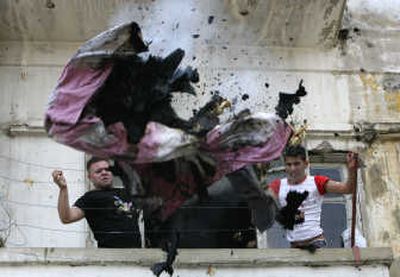Lebanon fighting moves to hills outside Beirut

BEIRUT, Lebanon – Lebanon hung between fears of all-out war and hopes for political compromise Sunday as government supporters and opponents battled with rockets and machine guns in the mountains overlooking the capital.
The fighting saw the collapse of pro-government forces in the Aley region, a stronghold of anti-Syrian Druse leader Walid Jumblatt.
Beirut was quiet a day after Hezbollah gunmen left the streets, heeding an army call for the Shiite fighters to clear out. The city was the focus of four days of Sunni-Shiite clashes that culminated with Hezbollah seizing large swaths of Muslim West Beirut – demonstrating its military might in a showdown with the government.
Thirty-eight people have been killed since Wednesday, when a power struggle between the Hezbollah-led opposition and U.S.-backed government began erupting into the worst sectarian violence since Lebanon’s 1975-1990 civil war.
Across the country, there were fears of another slide into civil war.
“I don’t believe this is the end,” said a 32-year-old employee of an insurance company who lives in a posh area of the Muslim sector that saw fighting three days ago. She declined to give her name for fear of retaliation.
“They haven’t solved the problem yet,” she added. “There will be another round.”
But some analysts saw Hezbollah’s demonstration of its power as paving the way for a solution to end the political crisis. They said the opposition appears to have the upper hand, which could force the government to compromise.
“The opposition is in control now. These military victories have to be translated politically,” said Amal Saad Ghorayeb, a political science professor who is an expert on Hezbollah.
“You can’t have a civil war when there is one group that is militarily superior to the others,” she said, referring to Hezbollah.
The violence was sparked when the government confronted Hezbollah with decisions to sack the chief of airport security for alleged ties to the militant group and to declare Hezbollah’s private telephone network illegal. Hezbollah leader Hassan Nasrallah said the decisions amounted to a declaration of war.
Overnight, there were fierce clashes in the north, particularly in Tripoli. One woman was killed.
Heavy fighting between government supporters and opponents broke out Sunday in the central mountain town of Aytat and surrounding areas, about nine miles from Beirut. Sounds of heavy machine-gun fire and explosions rolled across the capital.
Pro-government supporters of Jumblatt and Shiite gunmen and their allies exchanged rockets and machine-gun fire, security officials said on condition of anonymity because they were not authorized to speak to the media. Paramedics said 12 people were injured.
As the fighting raged in the mountain region, black smoke could be seen billowing from Druse villages. The violence spread to the nearby towns of Kayfoun, Qamatiyeh, Bchamoun and Chouweifat, they said.
The area had been controlled mostly by Jumblatt’s Progressive Socialist Party and its militia. Hezbollah on Saturday accused Jumblatt’s followers of killing two of their supporters and kidnapping a third.